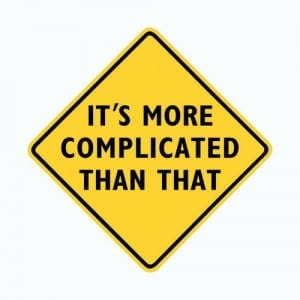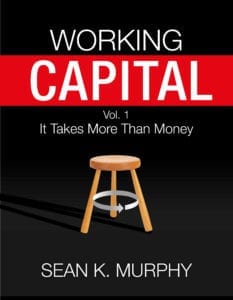Entrepreneurs starting their first business often hunt for a cookbook of recipes to make sense of a journey that is alternating between bewilderment and frustration. But startups fight for existence in a competitive and evolving environment, where changes in the technical or social substrates can invalidate their strategy or enable competitors without warning.
Entrepreneurs Cannot Rely on a Cookbook or a Manual
 Q: I was so excited that I had a framework to follow when I read “The Lean Startup.” Until I reached the end of chapter 12. On page 270 of the paperback book it says “Those who look to adopt the Lean Startup as a defined set of steps or tactics will not succeed.”
Q: I was so excited that I had a framework to follow when I read “The Lean Startup.” Until I reached the end of chapter 12. On page 270 of the paperback book it says “Those who look to adopt the Lean Startup as a defined set of steps or tactics will not succeed.”
That phrase made me question my entire interpretation of the book. As an engineer I tend to read a lot of things as manuals. That’s why I was so glad to read the first paragraph of the “How to Read this Book” section of the “Startup Owners Manual.” It says: “Clearly, the Startup Owners Manual is not a novel. This book is a step-by-step how-to guide that details a process for building a successful, profitable, scalable startup. It has more in common with a car repair manual than it does with your favorite page-turner.”
“A codified, repeatable, reusable practice contradicts the nature of innovation, which requires difficult, uncomfortable work to challenge the status quo of an industry or, at the very least, an organization.”
Helen Walters (@HelenWaters) in “Can Innovation Really be Reduced to a Process?“
A franchise business can have a cookbook, and a car repair manual is essentially part of a franchise, but my short answer is that I agree with Helen Walters and respectfully dissent from Steve Blank.
There are process aspects to entrepreneurship that are amenable to a cookbook approach, e.g. how to file for a trademark, how to rent office space, how to incorporate. But to the extent that they are “cookbook” they are not normally a source of competitive advantage: it’s possible to botch them but their successful execution means that you are average, they don’t help you differentiate your offering or provide a distinctive customer experience.
My longer answer is that a pattern match of car repair to startup entrepreneurship is inappropriate in many significant ways:


- A car is composed of interchangeable mechanical parts and some electrical and electronic components.
- A startup is composed of people, the technology is nothing without the team.
Parts are interchangeable, people are not
- Because car parts of interchangeable car maintenance consists of replacing worn or defective parts.
- Founders are not interchangeable parts and their replacement can kill an early stage company as often is it repairs it.
Car behavior is statistically predictable, startup/market behavior is emergent
- Car parts age in a statistically predictable way based on time and wear.
- Founders grow in fits and spurts, significant failures can either trigger learning or despair (or alternating waves of both). And teams developed shared tacit competencies that cannot be separated from their interactions.
Repair is not growth or new value creation
- Car maintenance is about a “return to zero” approach: you want the car to run as well as it did the day your drove it off the lot.
- Startups are about “getting away from ground zero” to a viable sustainable business. Many can get stuck in a “groundhog day” experience where they keep making the same mistakes. But if they resisted change in the same way that maintenance helps a car resist change they would never achieve their potential.
Startups operate in competitive and evolving environments
Startups fight for existence in competitive and evolving environments, where changes in the technical or social substrates can invalidate their strategy or enable new competitors without warning. McDonald’s can offer you a recipe for how to open a successful franchise because they have hundreds of examples of what the success and failure of a common model look like. You cannot follow a recipe for building the next Facebook because Facebook already exists. It’s like planting a seedling too close to a mature tree, both compete for the same sunlight, water, and nutrients and if they are the same species the mature tree will normally kill the seedling.
Entrepreneurship is not like first year calculus, a more or less fixed body of knowledge that can be mastered by a wide range of students in a fixed period of time. There are certainly principles that hold true, principles that are applicable to technology (e.g. “successful complex systems evolve from successful simple systems” Galt’s Law) and people (“trust is built over time”, “people don’t tell you when they stop trusting you”) but this is more about mastering a practice like medicine or architecture than memorizing a set of predetermined repair procedures and their common variations.
I think it’s more useful to look at innovation and entrepreneurship as requiring the mastery of key skills in the way that Clayton Christensen’s “The Innovator’s DNA” outlines, rather than a fixed set of codified processes you can follow “by the book” or a set of recipes you can rely on from a popular cookbook.
It’s More Complicated Than Recipes from a Cookbook
Entrepreneurship is an intellectual endeavor: you must juggle diverse information and manage the sequence and timing of your actions. It’s like playing multi-dimensional chess.
An innovation is a well designed experiment that may fail. You can do a wretchedly designed experiment that is doomed to fail and that is a total waste of time. Entrepreneurs need to think very carefully, both strategically and tactically, about what they wish to do.


They are sometimes encouraged in these beliefs by book authors and other consultants–and I say this as a consultant and author–whose promotional literature promises , “everything you know about entrepreneurship is wrong, but if you buy my book the secrets of the Universe will be unlocked for you.”
I can understand the desire for a treasure map, and certainly why some authors desire to sell a book priced as a treasure map, but it’s more complicated than that.
That’s why in “Working Capital: It Takes More Than Money” I focus on the assets that are unique to a startup team that they can leverage differentiate their offering their know-how and social capital. It’s not enough to spot an opportunity or have an idea for a product or service, you have to have accumulated skills and relationships that allow you to provide unique value to your customers.
Related Blog Posts
- Discovery, Invention, Growth, and Renewal
- Buying a Map vs. Learning to Explore
- Early Markets Offer Fluid Opportunities
- Entrepreneurs Exploit Errors in Conventional Wisdom
- Entrepreneurs Need to See With Newcomer’s Eyes and Ask Stupid Questions
- Scouting a Promising Market: Sending Spies Into Canaan
- Lee Carter on the Value of Direct Observation
- Chip Conley: Reconceive Bewilderment As Curiosity
- Experiments vs. Commitments
- Jim Manzi: Focus on Delivering Value to Customers at a Foreseeable Profit
- Bob Biglin’s Review of Working Capital: It Takes More Than Money
Photo Credits:
- “Lugar, field glasses and map” from Sergey Norin 56;
- “It’s More Complicated Than That” from Edward Tufte‘s series of “Philosophical Diamond Signs”

I’ve always heard similar sentiments expressed as a manual, but I definitely like the “cookbook” term better for this. There is no recipe. The conditions are always changing too much.
That’s why being adaptable isn’t really a plus for entrepreneurs; it’s a must and a prerequisite. Without it, luck is really the only thing that will get you anywhere for any amount of time.